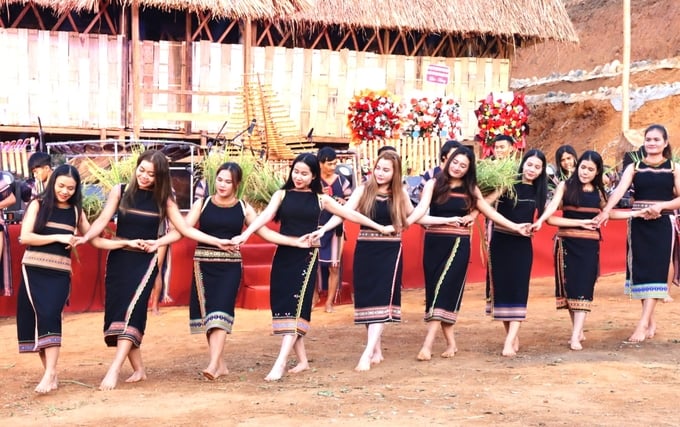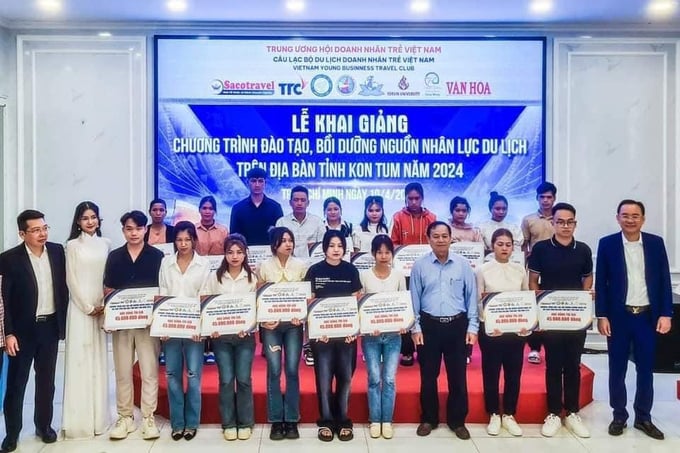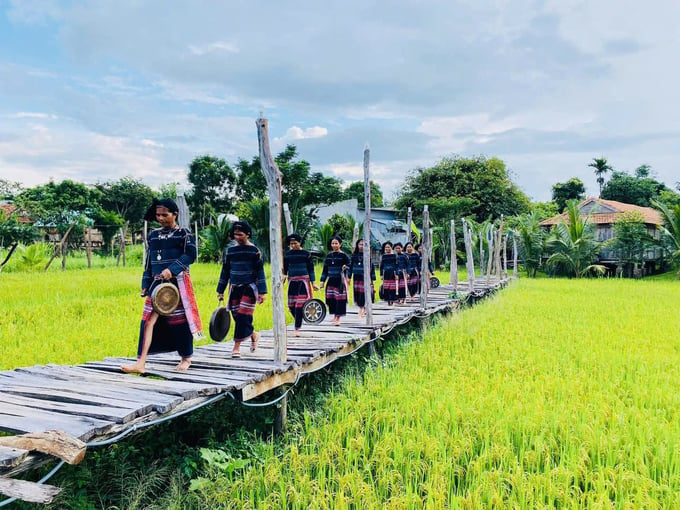May 24, 2025 | 16:21 GMT +7
May 24, 2025 | 16:21 GMT +7
Hotline: 0913.378.918
May 24, 2025 | 16:21 GMT +7
Hotline: 0913.378.918

Community tourism is thriving in the Northern Central Highlands. Photo: Tuan Anh.
Each region in the Northern Central Highlands provinces has its own potential and strengths for developing community tourism. Tu Mo Rong District (Kon Tum Province) is a prime example, identifying community tourism linked to medicinal herbs, especially the Ngoc Linh ginseng, which is considered a "national treasure" of Vietnam.
Recognizing the advantages of developing community tourism models, Tu Mo Rong District has selected individuals, primarily from the Xo Dang ethnic group, for training in tourism skills in Ho Chi Minh City.
Mr. Vo Trung Manh, Chairman of Tu Mo Rong District, stated that to develop community tourism effectively, it is crucial to have qualified human resources in this field. In this spirit, the district has sent several residents to Ho Chi Minh City to learn how to effectively manage community tourism, including training in guiding, reception, restaurant management and resort management. The training program lasts for 6 months, and currently, the participants are being sent to Mang Den Tourist Area (Kon Plong District) for practical experience before completing their course.
Coming from a freelance background, Mr. A Tao (Pu Ta Hamlet, Mang Ri Commune) went to Ho Chi Minh City to study community tourism with a major restaurant and hotel services. “After the training in Ho Chi Minh City, I and members of our group have gained an understanding of the community tourism development process, from communication and etiquette to providing the best possible service to tourists", Mr. Tao said.
According to Mr. Tao, Mang Ri Commune, where he lives, has developed community tourism models centered around Ngoc Linh ginseng. Many tourists visit to explore and experience the “national treasure” Ngoc Linh ginseng, which presents a great opportunity for future tourism development.
“We are currently in the process of practical training. After completing the course, we hope to make a positive contribution to community tourism in our area, helping visitors gain a deeper understanding of Ngoc Linh ginseng and our local culture”, Mr. Tao shared.

The Xo Dang people are being sent to Ho Chi Minh City for tourism training. Photo: Tuan Anh.
Similarly, Ms. Y Thoat (Tu Tho Hamlet, Te Xang Commune) was also sent for training in community tourism with a focus on restaurant and hotel services. Ms. Y Thoat mentioned that Tu Tho Hamlet is known for various community tourism activities. In addition to medicinal plants, visitors can explore the local culture and the stunning landscapes of the area. “The opportunity to study and gain experience in Ho Chi Minh City is a fantastic chance to better serve tourists when they visit our region”, Ms. Y Thoat shared.
Mr. Vo Trung Manh that the Xo Dang people sent for training come from villages that are already established in community - based tourism, such as Tu Tho, Le Vang, Dak Chum 1, and Pu Ta. Although these areas have not yet been officially recognized for tourism, they already attract many visitors. Once trained, these individuals will return to serve tourists in their own hometowns.
"After the first training course, we will conduct evaluations to draw lessons. If it proves effective and helps tourism development, we will intensify training programs for local people. Currently, several travel companies and the Vietnam Young Entrepreneurs' Tourism Club have plans to fund training programs to gradually improve the capacity of the Tu Mo Rong tourism industry to serve tourists", Mr. Manh shared.
According to Mr. Manh, by early 2024, the community-based tourism village in Tu Tho Hamlet (Te Xang Commune, Tu Mo Rong District) will be completed to host the International Culinary Competition with the theme: Medicinal Cuisine - The Essence of Ngoc Linh Mountains. This place has welcomed thousands of tourists and set a Vietnamese record for 120 dishes made from ginseng.
By 2025, Gia Lai Province's tourism sector aims to welcome 1.7 million visitors, generate an estimated revenue of 36.000 USD, and create over 3.000 direct jobs.
The province will focus on upgrading and investing in the development of community-based and rural tourism sites, aligning with the criteria for building new rural areas. It will orient and arrange rural tourism areas based on development potential, ensuring connection with key regional and local tourist routes. Additionally, the province will enhance the architectural and environmental landscape of the entire tourism area, preserving traditional cultural heritage while ensuring sanitary conditions. It will also establish and build points and centers for displaying, introducing and selling OCOP products, traditional handicrafts and souvenirs.
To realize this goal, training human resources for community and rural tourism is crucial. Recognizing this need, the Gia Lai Department of Culture, Sports and Tourism has invited experts to provide training on developing rural tourism models for 8 districts and towns in the province. The paticipants includes officials responsible for specialized departments at the district, commune, hamlet and village levels, as well as cooperatives and households involved in OCOP products and agriculture. The aim is to train 50 participants in community tourism skills in each locality.

The unique cultural features of the ethnic groups in the Central Highlands always attract tourists. Photo: Tuan Anh.
At a recent seminar on tourism development, Master Le Thi Tinh, a lecturer at Gia Lai Province Political School, said that to develop community tourism, it is essential to raise awareness and provide opportunities for local villagers to learn from experiences in other areas. Additionally, when planning community tourism villages, it is crucial to respect cultural elements such as architecture and village space. Avoiding concrete overdevelopment is important, as it can damage the landscape and diminish the emotional experience for visitors.
According to Ms. Tinh, most residents in the villages lack tourism skills, particularly financial knowledge for managing income and expenses when hosting visitors. Therefore, it is essential for government agencies to provide support, including training programs and guidance for local people to effectively engage in tourism.
Recently, the Vietnam Young Entrepreneurs' Tourism Club has been actively supporting human resource training for the tourism sector in the Central Highlands provinces. Mr. Nguyen Ngoc Tan, Chairman of the Vietnam Young Entrepreneurs' Tourism Club, said: “We hope that after the training, the participants will return to their localities not only to take on direct responsibilities but also to share their knowledge with everyone in their village or community. This way, the tourism workforce in these areas will be expanded and developed. As a result, tourism practices in these regions will become more professional and sustainable, contributing to greater satisfaction for visitors to the Central Highlands”.
At a recent conference on tourism development in Gia Lai, Vice Chairman of Gia Lai Provincial People's Committee, Nguyen Thi Thanh Lich, stated that the locality will continue to improve the quality of human resources in the tourism sector. Specifically, the province plans to organize community - based and rural tourism training courses in various areas, focusing on essential skills for interacting and serving tourists.
Translated by Phuong Linh

(VAN) In the tranquil wetlands of Van Long, there are quiet souls who guard the forests, nurture the waters, and oversee every bird and troop of langurs as protecting the essence of a living heritage.

(VAN) WWF, GIZ, IUCN, UNDP call for biodiversity conservation and sustainable development must be regarded as a unity in strategies for a green future.

(VAN) On celebration of International Day for Biological Diversity, Deputy Minister Nguyen Quoc Tri called for practical actions to address nature and biodiversity conservation.

(VAN) Dr. Hoang Thi Thanh Nhan – Deputy Director of the Nature and Biodiversity Conservation Agency – highlighted this on the International Day for Biological Diversity, May 22, 2025.
![Ho Chi Minh city adapts to climate change: [2] Accelerating action](https://t.ex-cdn.com/nongnghiepmoitruong.vn/608w/files/chiqk/2025/05/22/4024-4220-bien-doi-khi-hau-1-100626_766.jpg)
(VAN) Clearly recognizing the challenges posed by climate change, Ho Chi Minh city has swiftly shaped its policies and implemented practical solutions to adapt.

(VAN) Rice straw is no longer just a discarded byproduct, but it is becoming a green resource that helps farmers in the Mekong Delta reduce emissions and promote circular, sustainable agriculture.

(VAN) Other Effective Area-based Conservation Measures (OECMs) are solutions that contribute effectively to achieving the goals of the Kunming–Montreal Global Biodiversity Framework.